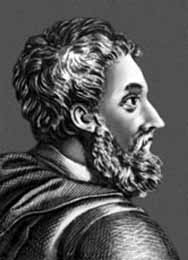Empedocies

Empedocles (of Acagras in Sicily) was a philosopher and poet: one of the most important of the philosophers working before Socrates (the Presocratics), and a poet of outstanding ability and of great influence upon later poets such as Lucretius. His works On Nature and Purifications (whether they are two poems or only one – see below) exist in more than 150 fragments. He has been regarded variously as a materialist physicist, a shamanic magician, a mystical theologian, a healer, a democratic politician, a living god, and a fraud. To him is attributed the invention of the four-element theory of matter (earth, air, fire, and water), one of the earliest theories of particle physics, put forward seemingly to rescue the phenomenal world from the static monism of Parmenides. Empedocles’ world-view is of a cosmic cycle of eternal change, growth and decay, in which two personified cosmic forces, Love and Strife, engage in an eternal battle for supremacy. In psychology and ethics Empedocles was a follower of Pythagoras, hence a believer in the transmigration of souls, and hence also a vegetarian. He claims to be a daimôn, a divine or potentially divine being, who, having been banished from the immortals gods for ‘three times countless years’ for committing the sin of meat-eating and forced to suffer successive reincarnations in an purificatory journey through the different orders of nature and elements of the cosmos, has now achieved the most perfect of human states and will be reborn as an immortal. He also claims seemingly magical powers including the ability to revive the dead and to control the winds and rains. Download
Anaxagoras

Anaxagoras of Clazomenae was an important Presocratic natural philosopher and scientist who lived and taught in Athens for approximately thirty years. He gained notoriety for his materialistic views, particularly his contention that the sun was a fiery rock. This led to charges of impiety, and he was sentenced to death by the Athenian court. He avoided this penalty by leaving Athens, and he spent his remaining years in exile. While Anaxagoras proposed theories on a variety of subjects, he is most noted for two theories. First, he speculated that in the physical world everything contains a portion of everything else. His observation of how nutrition works in animals led him to conclude that in order for the food an animal eats to turn into bone, hair, flesh, and so forth, it must already contain all of those constituents within it. The second theory of significance is Anaxagoras’ postulation of Mind (Nous) as the initiating and governing principle of the cosmos. Download